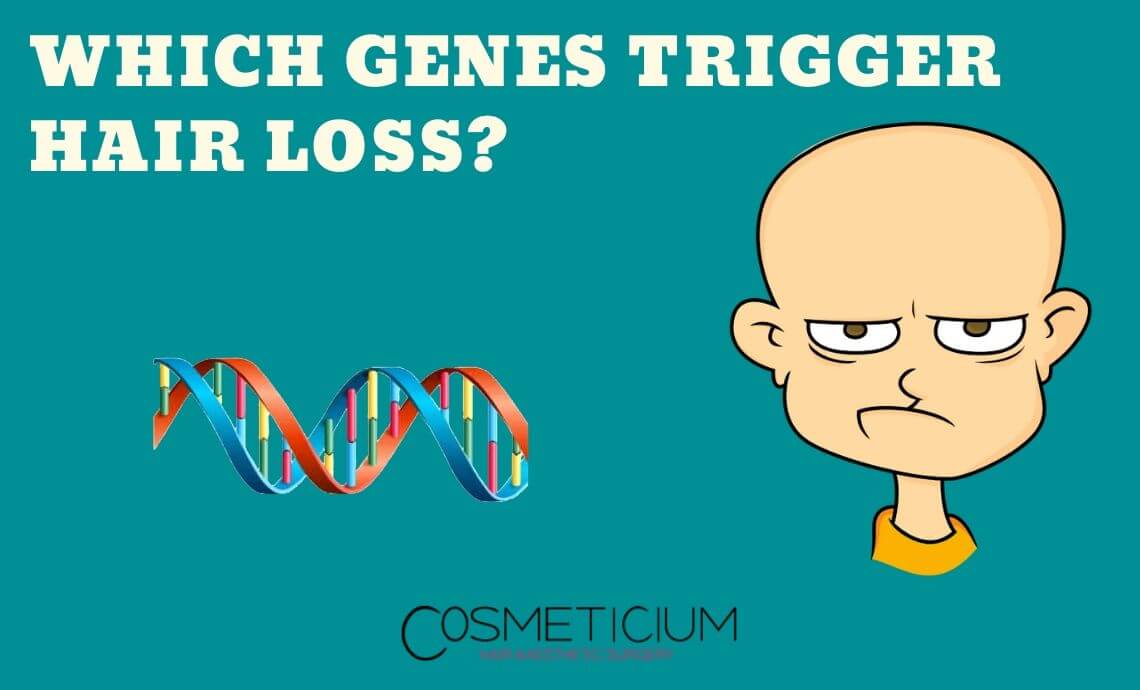The general functioning and structure of the human body are determined by genes. Genes from mother and father determine your inherited characteristics. Eye colour, the size of your hands, the diseases that you are at higher risk of, and similar issues are directly related to the genes. Similar to these, whether hair loss is also related to genes has been a long time wonder. It is generally known that genes have an effect at this point. But which genes trigger hair loss? This is the real question. Also, whether these genes can be corrected and whether the genes can be prevented from causing hair loss or not are other issues that are wondered. You can find details about these issues in the rest of our article.
How do genes affect hair loss? Is it possible to stop this negative effect of genes? All can be found in our article…
Table of Contents
What Do Genes Affect?
If you have taken biology lessons at school, you probably know how important genes are. Genes, or DNA, are the basic units that contain all your information. Depending on your DNA structure, your body structure is shaped. Your health, physical characteristics, psychology, and much more are related to your genes. As stated above, genes have an effect even in a number of diseases that you had or may have. You may be more prone to a number of diseases due to your gene structure.
Today, research studies on the causes of a number of diseases and problems such as hair loss, focus on the gene structure. The differences here are examined and solutions are tried to be found in this way.
Effects of Genes on Hair Loss
There are different reasons for hair loss. However, when the different hair loss cases seen in the world are examined, it will be seen that a significant part of them are caused by the condition called androgenetic alopecia. The cause of this condition, also abbreviated as AGA, is not known exactly. However, studies point out that genes are the basis of this condition.
The main reason for androgenetic alopecia, or otherwise known as male-type hair loss, is the unusual sensitivity of individuals to dihydrotestosterone (DHT). People who are more sensitive to DHT hormone may develop baldness when necessary precautions are not taken. The answer to the question of why some people have higher DHT sensitivity is thought to be genes.

It is accepted that people with hair loss and baldness in other individuals in their family have a higher risk of experiencing similar problems. Research on this acceptance shows that the relevant acceptance is actually correct. People who have baldness in their father or other family members have a higher incidence rate of hair loss and baldness. This directly indicates the effect of genes on hair loss. So, what genes cause hair loss?
You May Also Like: Hereditary Hair Loss and Treatment Methods
Which Genes Cause Hair Loss?
Different studies have been conducted on why hair loss occurs. Some of these studies have focused on heredity. The main reason for this is the idea that hair loss occurs due to the genetic structure. Some of these studies have produced very important results.
A UK-based research company has done extensive work on this topic. This study was conducted on people with different levels of hair loss. Interesting results have been obtained in the research conducted on more than 52,000 men aged 40 to 69 years. It has been determined that there are around 250 genes that affect hair loss.
Another important result obtained in the research is related to male type hair loss. All of the genetic signals that cause this type of hair loss are related to the X chromosome coming from the mother. In other words, male-type hair loss may be a condition that passes through the mother and not the father. Studies in this area are ongoing.
Can Hair Loss Caused by Genes Be Prevented?
When it comes to hair loss caused by genes, androgenetic alopecia usually comes to mind first. Although it seems impossible to prevent this type of hair loss, early intervention is very important here. It is known that drugs such as Minoxidil and Finasteride give very effective results against hair loss. In addition, PRP and stem cell therapy are also effective.
The aforementioned treatments only work during the hair loss process. So after the hair is completely lost and the hair follicles die, these treatments have no effect. People need to be careful at this point. If they encounter unusual hair loss, they should go to the doctor directly and investigate the reason for it. Also, the necessary measures should be taken after this stage. Enriched plasma or stem cells from the blood yield effective results on the scalp.
If someone in your family has baldness, you can choose the treatments mentioned here as an early precaution. At this stage, you can talk to your doctor and act on his recommendations. This will significantly reduce your risk of complete baldness.
If you are not treated on time, it is inevitable that a part of your head will get bald. After this stage, the most effective solution you can choose is hair transplantation. In hair transplantation, hair follicles in your nape area or in a different donor area are removed. These are then transferred to the non-hair area. In this way, you have natural-looking hair.
Click For More Information About PRP Treatment That Stops Hair Loss.

